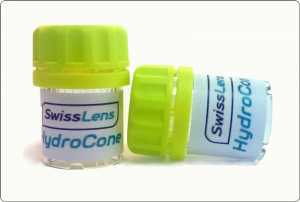 
The HydroCone are a custom made soft keratoconus contact lenses with an unique design. The patented dynamic stabilization retain the same oxygen supply at the limbus comparing a standard prismatic contact lens. This soft keratoconus contact lenses are available as a single vision, but also in a multifocal version. Depending on the stage of the keratoconus, the HydroCone is available for early and advance stage keratocone. The design provides the patients with comfort as a standard soft contact lens and visual acuity similar to rigid lenses.
Geometrie
- Spherical back optic zone with strong aspheric flattening
- Front toric optic zone
- Dynamic stabilisation with bumps nasal and temporal
- Optimised centre thickness

Variations
 keratoconus of degrees 1 to 2 keratoconus of degrees 1 to 2
 keratoconus of degrees 3 to 4 keratoconus of degrees 3 to 4
HydroCone P
Multifocal-torical front optic zone in Bifocal (Bf) / Simple progressive (Sp) / Multi progressive (Mp)
Technical data
- Total diameter: 12.00 -> 15.00 mm
- Base curve: 7.00 -> 12.00 mm
- Sphere: -40.00 -> + 40.00 dpt
- Cylinder: -0.25 -> -8.00 dpt
- Axe: 0° -> 180°
- Addition: +0.50 ->+4.00 dpt
- Central optical zone Zoc: 1.00 -> 4.50 mm
- Flattening: (+) K12/ (+) K34
steps 0.01 mm / 0.01 dpt / 1°
First fitting
We suggest working with trial lenses with cyl −0.01 dpt.
Keratoconus classification
First apply the topographic indications or the following rules:
- Vcc > 0.6 and/or keratometry > 6.80 mm: grade 1 or 2 (HydroCone K12)
- Vcc < 0.6 and/or keratometry < 6.80 mm: grade 3 or 4 (HydroCone K34)
Diameter and base curve: 1st trial lens
- HydroCone K12: rO = 8.00 / ØT = 14.00 mm
- HydroCone K34: rO = 7.80 / ØT = 13.70 mm
Advice
- The first trial lens helps to validate rO / ØT.
- Dynamic stabilisation marks are needed
- to measure the stabilisation axis
- The power (F’v) is spherical because part of the correction is made by the tear film and can’t be anticipated. The final cylinder corresponds to the residual astigmatism.
- F’v for the trial lens order: spectacle sphere (adjust BVD = 0) with −0.01 dpt × 180° cylinder
- For changes and control over several months always use the initial (genesis) lens for over refraction.
- Use upper and lower eyelids to remove the contact lens.
- By halo, increase optic zone diameter
- Measurement of the residual astigmatism with autorefractometer plus subjective refractometry.
- Due to geometry, the contact lens can slip a little bit to the bottom.
- Increasing centre thickness can improve the visual acuity.
- HydroCone P fitting: initially fit with HydroCone (single vision toric lens) then add progression in a second step.
Materials: Silikon-Hydrogel Definitive 74%, Igel 77%
Recommended Lens Care Solution:
.jpg)
|
Tekniske data:
Total diameter 12.00 => 17.00 mm
Base curve 7.20 => 10.80 mm
F'v Sphere -40.00 => +40.00 dpt
Cyl -0.25 => -8.00 dpt
Axis 0° => 180°
Addition +0.50 => +4.00 dpt
Flattening K12 + K34 ++
Optimised centre thickness Default: K12 = 0.42mm, K34 = 0.52 mm
Range of thickness: 0.35 => 0.59 mm
Central optic zone 5.00 => 7.50 mm
Materials: Definitive 74 / Igel 77
Geometry
HydroCone Spherical back optic zone with strong aspheric flattening Front toric optic zone
Dynamic stabilisation with bumps nasal and temporal Optimised centre thickness
HydroCone P
Front optic zone Bifocal (Bf) / Simple progressive (Sp) / Multi progressive (Mp) |










.jpg)